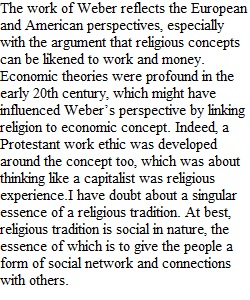


Q 1. Identify some terms from Chapters 3 and 4 of Herling that seemingly reflect a European, American, and/or Christian-centric bias. How do they do so, and why? 2. At this point, what is your view on the quest to discover a singular essence of a religious tradition, or religion in general? Make sure to explain your answer in light of course materials. 3. Identify and discuss specific examples of patriarchal values and structures in the religious traditions you have studied. How do these contribute to defined social and religious roles based on gender? 4. Identify, describe, and discuss specific examples of the regulation (or celebration) of the body and sexuality in religious scriptures, beliefs, or practices. 5. Identify, describe, and discuss examples of religion’s role in constructing our ideas about race and ethnicity—instances where it promotes hierarchy and differences, or aims to overcome and transcend difference. 6. According to Herling, what is the relationship between religion and globalization? How has globalizations affected religious communities, and vice versa? 7. Discuss several new religious movements. Who belongs to these movements, and why? 8. What are some of the most commonly cited instances of the link between religion and violence? How direct is this link? What other factors might be at work in these cases? 9. What are some examples of the interplay between science and religion, ranging from opposition to synthesis?
View Related Questions